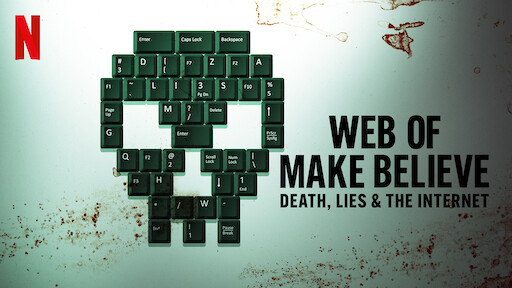- Get link
- X
- Other Apps
Posted by
Scott Martin
- Get link
- X
- Other Apps
Web of Make Believe: Death, Lies & The Internet is a true crime docuseries that landed on Netflix in June of this year. Despite being produced by Ron Howard and Brian Grazer, you won't be able to find a Wikipedia page for this series (at the time of writing this). The production value of the series is terrific and it's well researched, so don't let the lack of Wiki presence make you instantly feel as though this is a lesser product that nobody cares about.
The focus of Web of Make Believe is highlighting different crimes of the internet and the impacts of those activities. The first episode investigates the issue of swatting, where someone contacts emergency services about a fictitious incident to get a SWAT team sent to a person's house. The most well known case of this ended with an innocent person getting shot and killed by police. Other episodes explore topics such as sexploitation, and highjacking the narrative of a murder to spin people's own views and further their personal and political agendas.
The series begins with what I can only call a rock and roll re-enactment, and I instantly felt as though this was an indication that the entire series would be a complete train wreck. If you are a regular reader here, you will be well aware of my thoughts on re-enactments in both documentaries and docuseries. If ever there was a technique that was overused as well as misused, this would be it. Grinding my teeth in fear, I wondered what exactly I had put in my path.
The biggest strengths of this series are the production quality, the exploration of the topics, and the relevant talking heads. While there was an onslaught of re-enactments, the majority of them actually worked in telling the story. They were just visual flair to accompany the extremely compelling material that was being covered.
Director Brian Knappenberger showed a meticulous approach to both story telling and informing the viewer. Aghast with my misguided sensibilities, the narrative (brimming with well shot re-enactments) overcame any objections that I may have had. From strictly the perspective of weaving a tale, this series was streets ahead of the majority of docuseries that I have reviewed for this site. I was hooked, and after an episode ended I was already anticipating pressing play on the next.
The last two episodes of this six part series focused on one crime specifically. It was the tale of an internet fraudster who got caught and unsuccessfully defended himself in court. These two episodes came across as supposedly being the biggest story of the series. For myself, it was a giant let down. The crimes weren't massive or really that newsworthy when compared to earlier entries. The outcome of this case had a large societal impact, but it just wasn't as captivating as the first four episodes. To use this phrase in the most literal of terms, I just couldn't care less.
All of the momentum I felt through the series disappeared, and those two episodes ended up altering my overall appeal for Web of Make Believe. While there were way too many re-enactments in the previous episodes (which somehow managed to work), the fifth and six instalments were more in line with scripted film than any kind of documentary format. I felt beaten down by this, continually watching scenes that were bringing the sensational aspect forth that I so dearly despise. All of it was distracting. Without this over indulgence of acted sequences, the story could have been brought down to a single episode and would have been much more enticing.
I'm not sure what's worse for me, a series that is constantly feeling sensationalized or what that deviates into that realm in its closing chapters. Should it be woven into the entirety of the series, I know what I'm wading in and I have appropriate expectations. When there is a solid start, such as with Web of Make Believe, the deviation just zaps all of the energy and squats that final taste in the mouth that I just cannot get rid of. The first four episodes, while not perfect, were very engaging. The drastic change in tone for episodes five and six was the biggest crime here, and came across as misguided.
Rating - 3 out of 4 stars
- Get link
- X
- Other Apps
I'm smarter than a bat. I know this because I caught the little jerk bat that got in my apartment, before immediately and inadvertently bringing him back in. So maybe I'm not smarter than a bat.

Comments
Post a Comment